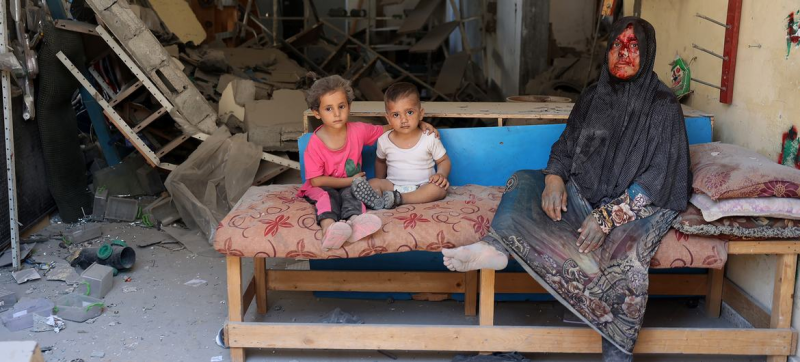- UNRWA Situation Report on Crisis in Gaza & Occupied West Bank |
- Intimidation or bloodshed cannot halt Bangladesh’s march to democracy |
- Khaleda Zia integral to an important chapter in BD history: Yunus |
- Enthusiasm marks Victory Day celebrations across Bangladesh |
- Dhaka-Delhi ties deep; to be shaped by trust, dignity, mutual respect |
‘Our Kids Cry for Food’: Most Gaza Families Survive on One Meal

A woman and her children sit inside their destroyed home, in Burij in the central Gaza Strip.
Most families in the Gaza Strip are surviving on one meal a day, and one-third go entire days without eating due to Israel’s continued bombardment of the enclave, according to the UN World Food Programme (WFP) and partners.
The meals families can obtain are nutritionally poor — thin broths, lentils or rice, one piece of bread, or sometimes just a combination of herbs and olive oil known as duqqa.
Adults routinely skip meals to leave more food for children, the elderly, and the ill. Still, on average since January, 112 children have been admitted daily for acute malnutrition.
“When my children wake up at night hungry, I tell them, ‘Drink water and close your eyes.’ It breaks me. I do the same — drink water and pray for morning,” said one parent.
Due to extreme food shortages, people in Gaza risk their lives daily to access small amounts of food. Since 27 May, 549 Palestinians have been killed and 4,066 injured trying to reach food, according to Gaza’s Ministry of Health.
“The majority of casualties have been shot or shelled trying to reach US-Israeli distribution sites set up in militarized zones,” said Jonathan Whittall, head of the UN humanitarian affairs agency OCHA in the Occupied Palestinian Territories.
Since the end of May, the US-Israeli-backed Gaza Humanitarian Foundation (GHF) has been distributing aid in Gaza, bypassing the UN and established NGOs.
The UN has said Palestinians seeking aid from the GHF face threats of gunfire, shelling, and stampedes.
“We don’t want to be out there. But what choice do we have? Our kids cry for food. We don’t sleep at night. We walk, wait, and hope we come back,” a Palestinian told the WFP.
Prolonged conflict and bombardment have pushed nearly all service systems in Gaza to the brink.
Due to fuel shortages, only 40 percent of drinking water facilities are functional, and 93 percent of households face water insecurity.
Fuel shortages are also affecting medical services, with equipment and medicine storage reliant on electricity.
For the first time since limited aid entry resumed on 19 May, nine trucks carrying medical supplies were offloaded on the Israeli side of the Kerem Shalom crossing on Wednesday.
Since Israeli bombardment resumed on 18 March after a 42-day ceasefire, over 684,000 Palestinians have been displaced—many repeatedly.
With over 82 percent of Gaza designated as Israeli militarized zones or under displacement orders, few safe places remain for the newly displaced.
They are forced to shelter in overcrowded camps, makeshift shelters, damaged buildings, or even on open streets. Schools have become shelters instead of places of learning.
“Schools have transformed into empty shelters, devoid of any elements of a safe learning environment,” said Kamla, a UN Relief and Works Agency (UNRWA) teacher in Nuseirat.
Deteriorating conditions in shelters result from insufficient materials, said Stéphane Dujarric, spokesperson for the UN Secretary-General.
“No shelter materials have entered Gaza since 1 March, before a near-80-day blockade on aid and supplies was imposed,” he added.
While small amounts of some commodities have been allowed in, tents, timber, tarpaulins, and other shelter items remain banned.
The UN and partners have 980,000 shelter items ready to send once Israeli authorization is granted.
Since the violence began, UNRWA has worked tirelessly to support displaced and injured Palestinians.
“UNRWA staff are not just service providers; in Gaza, we are pillars of resilience, lifelines of stability, and symbols of hope,” said Hussein, a UNRWA worker in Gaza City.
But fuel shortages and minimal aid through the Kerem Shalom crossing are making humanitarian work increasingly difficult.
“We have lost many tools to work, so we’ve had to adapt,” said Neven, a psychosocial UNRWA worker in Khan Younis.
Despite efforts, bombardment and devastation continue, with children going hungry and some expressing suicidal thoughts.
“I told my daughter her deceased father is safe, eating and drinking with God,” one mother said. “Now, she cries every day and says, ‘I’m hungry and want to go to my father because he has food to feed us.’”

